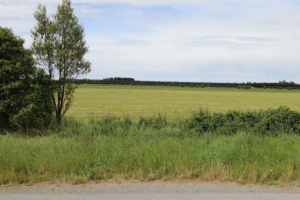It is possibly possible to grow bananas in New Zealand. In greenhouses. At great expense.
Suppose that New Zealand had no way of importing bananas. For purposes of the thought experiment, the things just rot in transit.
So we have a banana industry here growing bananas at high cost.
Then, an innovation! Bananas become tradeable and imports are possible - and no biosecurity issues. The boats start landing, laden with the tasty luxury.
Local industry complains. Production costs here are very high compared to islands where there is no need for greenhouses. Surely that kind of competition is unfair to local producers. The playing field should be leveled. The New Zealand government should provide subsidies to offset the unfairness of foreign climates.
We'd be nuts to do that, right? The ability to import low-cost bananas means that banana-producers here can shift to doing other, more valuable work. And we all get to eat more tasty bananas. Or not, depending on our preferences.
Complaining about foreign subsidy regimes makes as much sense as complaining about foreign climate for growing bananas. With one difference. If it were possible to get an international treaty banning climates good for growing bananas, that would be terrible. It would hurt others to no overall benefit.
But if we could get an international subsidy-control regime, like an arms control treaty, banning subsidies on films, or on video game production, that would be to the good.
Dileepa Fonseca goes through some of the pleading for video game subsidies over at BusinessDesk ($). The Australian subsidies are claimed to be on the order of 40-45%. Just ridiculous.
The climate for growing bananas abroad is a lot better than in NZ for reasons entirely outside the control of the NZ govt or NZ producers; we oughtn't subsidise banana-growing here to match it.
The climate for growing video-games is better in Oz because the Australian government has the equivalent of a giant subsidised greenhouse. They're showing no signs of wanting to tear the thing down. It would make a ton of sense for NZ to try to lead international agreements against these kinds of subsidies - in videogames, and in film, that just induce industries to flip jurisdiction in pursuit of subsidies.
But it doesn't make sense to subsidise our own greenhouses. If Oz wants to throw ridiculous amounts of money at videogame making, it just doesn't make sense to try to keep up. The industry here will shrink; resources will be released to work in other sectors. Stupidly, one of those sectors will be the subsidised NZ film industry.
Dileepa quotes industry giving the standard line that taxes paid by workers in the subsidised industry could wind up being higher than the amount of the subsidy. But that's completely irrelevant. Absent the subsidy, people would work in other industries where they'd pay taxes. If we extended that argument generally, it would mean giving every damned company a subsidy of up to a dollar less than the amount of tax paid by its workers. It's nuts.
He also has a bit from me:
However, there are many who are deeply sceptical, critical, or both, of the benefits of such rebates and offsets.
NZ Initiative chief economist Eric Crampton acknowledged the Australian scheme could see gaming jobs shift across the Tasman, but he said this was an argument for NZ to advocate that Australia remove theirs not that NZ taxpayers match their contribution.
“Getting into subsidy races would be a terrible mistake. If an industry can only thrive here if it is heavily subsidised, should it really be based here? “Or should the workers and capital that it would be using instead shift over to industries that can do well even without subsidies?”
Crampton also said it would be a mistake to participate in a subsidy war with countries that had deeper pockets.
He said film industry subsidies enabled more highly skilled domestic film production and this was the major benefit he accepted came from such subsidies rather than other oft-touted aims like employment.
But Crampton also said film subsidies were expensive and NZ's experience of using them showed such measures had no real endpoint.
“And we then wind up in the bizarre situation in which we have subsidised training programmes to encourage kids to pursue careers in the film sector rather than other industries – careers that can only be viable here if large subsidies to the industry sector continue.
“Every year we subsidise the training of the next set of hostages to be held to ransom against any threat of ending film subsidies.”
I should have said "held AS ransom". Doh.
Anyway: don't get stuck in more subsidy traps, like we're stuck in with film.



